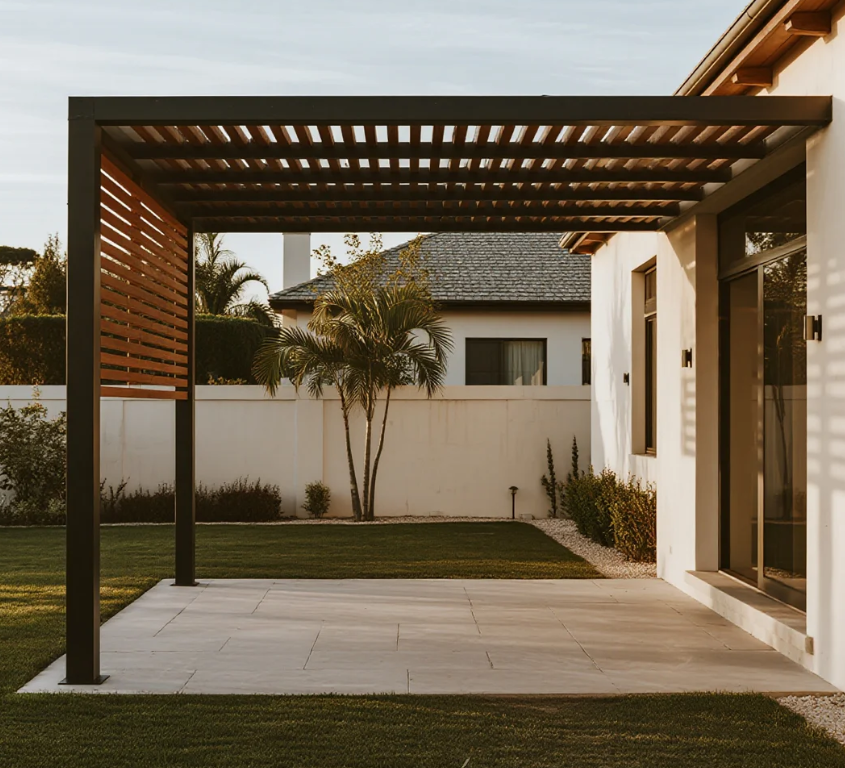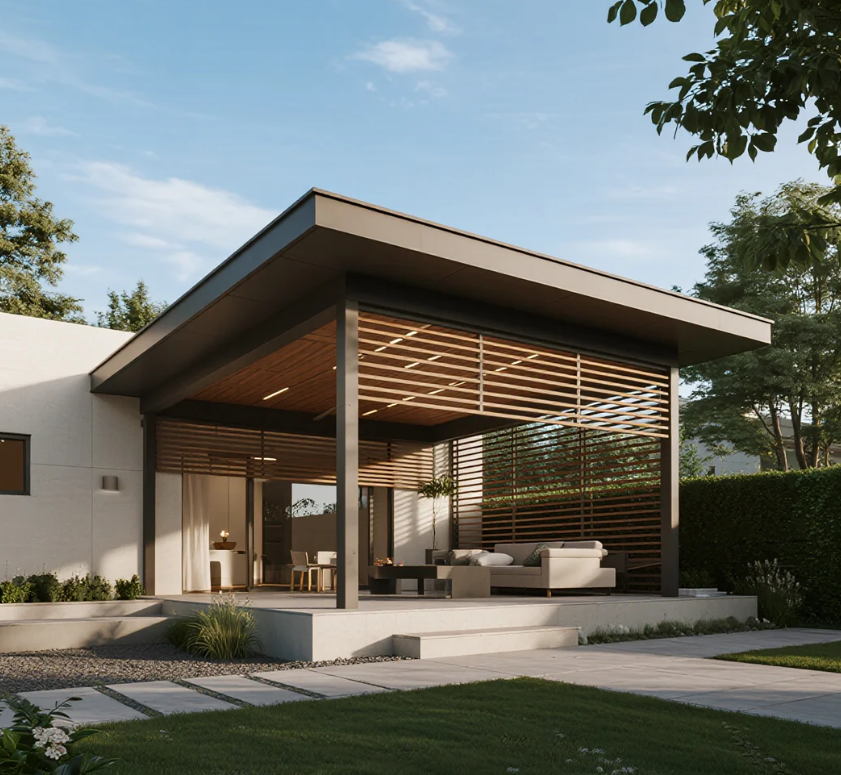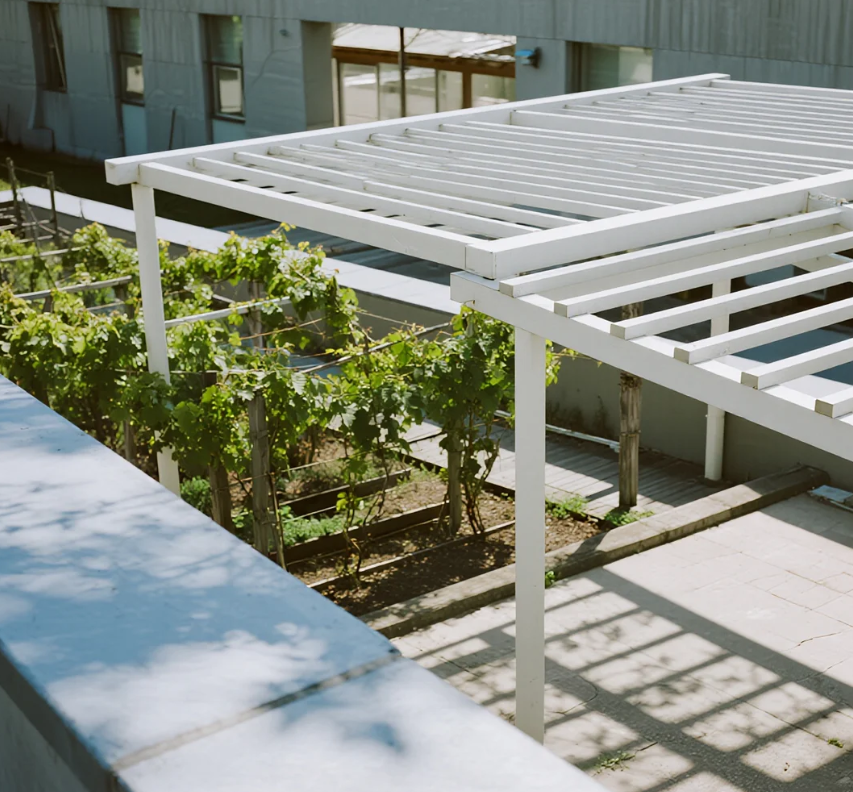
Understanding the Functional Differences
Fixed Roof vs Adjustable Louvers
Traditional pergolas typically feature a fixed roof design, usually made of wood or polycarbonate panels. These structures offer partial shade but are static—they can’t respond to weather changes or shift sunlight exposure. On the other hand, a Louvres Pergola is engineered with motorized adjustable louvers that can rotate up to 150°. This feature allows homeowners to control sunlight and airflow in real time with just a remote or smart app.
Here’s how the core differences break down:
| Feature | Traditional Pergola | Louvres Pergola |
|---|---|---|
| Roof Type | Fixed slats or panels | Adjustable aluminum louvers |
| Sun Control | Limited | Fully adjustable |
| Automation | None | Motorized, smart-integrated |
| Flexibility | Low | High |
| Maintenance | Moderate to high (wood upkeep) | Low (aluminum structure) |
Adjustable louvers give you the ability to create a microclimate in your backyard—you can block out harsh midday sun, allow morning light, or ventilate heat and moisture out after rain. The freedom to pivot the slats also reduces indoor cooling costs by limiting direct sunlight on adjacent windows.
Weather Adaptability and Ventilation
One of the biggest advantages of a modern louvered pergola is its ability to adapt to shifting weather conditions instantly. Traditional pergolas leave outdoor spaces exposed to rain and excessive sunlight, whereas an Aluminum louvered roof gazebo comes with an integrated gutter and drainage system. When the louvers close completely, rainwater is channeled through hidden beams, keeping your patio completely dry.
The louvers are made from high-grade Aluminum Alloy 6005 T5, known for its rust resistance and structural durability. This specific aluminum alloy is sanded for a premium matte texture and engineered to withstand high wind loads up to 60mph.
Ventilation is another core benefit. Adjustable louvers allow hot air to escape upwards naturally while drawing in cooler air from the sides. This effect is magnified during summer months when thermal regulation can reduce perceived heat by 5–8°F under the shaded area.
A well-designed aluminum pergola doesn’t just shield you from rain; it transforms your patio into a smart, breathable structure that adapts in seconds.
Shade Control and Rain Protection
Traditional pergolas offer fixed shade that rarely aligns with the sun's movement. This leads to inconsistent shading during different times of the day, often requiring curtains or add-on covers for real functionality.
In contrast, louvered pergolas let you fine-tune light exposure throughout the day:
-
Open the louvers fully in the morning to let in soft light.
-
Angle them at 45° during midday to reduce glare and UV.
-
Close them completely during heavy rain or peak sun hours.
These micro-adjustments offer superior comfort and reduce the need for secondary accessories like shade sails or umbrellas.
All our aluminum pergolas come with a 15+ year structural warranty and can be customized in size, color, and finish to match modern outdoor aesthetics. The average louvered pergola spans 10x12 feet, though customized options can extend beyond 20x20 feet for luxury installations.
The added value of a fully sealed louver system with rain protection and controlled shade cannot be overstated. It allows year-round usability without compromising on comfort or style.
The difference in functionality between traditional and louvered pergolas is not just in design, but in the experience they deliver.

Comparing Materials and Durability
Aluminum vs Wood: Which Lasts Longer?
When it comes to outdoor structures, material choice can make or break long-term performance. Wood pergolas, while classic and warm in appearance, generally last around 10 to 15 years with regular maintenance. In contrast, a Louvres Pergola crafted from Aluminum Alloy 6005 T5 offers a 15+ year warranty with minimal upkeep. These aluminum systems are engineered for durability, and they don’t warp, crack, or degrade from moisture.
Here’s a breakdown:
| Feature | Aluminum Pergola | Wood Pergola |
|---|---|---|
| Lifespan | 15-20+ years | 10-15 years |
| Maintenance | Very low (occasional cleaning) | High (sealing, staining yearly) |
| Vulnerability | No rot, warping, or termites | Prone to rot, termites, warping |
| Structural Strength | Consistent over time | Weakens with age and weather |
Aluminum doesn’t just last longer—it stays looking newer, longer. Plus, it comes with modern design finishes that don’t fade under sunlight.
Maintenance Needs Over Time
Routine care is where traditional wood pergolas start demanding more from you. For example:
-
Wood pergolas require annual sanding and sealing to prevent water absorption and cracking.
-
You’ll need to inspect joints and posts every 6 months for signs of termite damage or structural stress.
-
Over time, expect to repaint or re-stain wood to maintain a consistent appearance, especially in humid or coastal climates.
Meanwhile, with an Aluminum modern pergola, you’re simply looking at:
-
A quick rinse with a hose or sponge a few times a year.
-
Tightening any fasteners annually if needed.
That’s it. No rot, no fading, no flaking paint. These systems are built to resist wear in high UV, rain-heavy, or snowy regions.
Resistance to Rust, Rot, and UV
Let’s get specific. Wood begins to deteriorate from the inside once it’s exposed to constant moisture. Even with sealants, UV rays break down wood fibers, causing fading, splintering, and eventual cracking. Meanwhile, aluminum is inherently:
-
Non-corrosive, especially when powder-coated or sanded.
-
UV-resistant, so it won’t lose color or become brittle.
-
Rot-proof and insect-resistant, making it ideal for damp, tropical, or marine climates.
In terms of lifecycle cost and long-term looks, aluminum wins by a mile. It stays sleek, strong, and low-maintenance, while wood gradually becomes a weekend project you didn’t sign up for.
This is why more homeowners are leaning toward aluminum louvered roof gazebo systems like this one—they offer better longevity, cleaner lines, and higher performance year-round.

Installation and Customization Options
Pre-Built Kits vs Fully Custom Pergolas
When it comes to outdoor structures, pre-built pergola kits offer convenience, but not always satisfaction. These kits usually come in standard sizes like 10x10 ft or 12x12 ft, and while they’re faster to ship and cheaper upfront (typically $2,500–$4,000 for a basic aluminum model), they lack the design flexibility needed for unique landscapes or non-standard spaces.
On the flip side, fully custom louvered pergolas—like the ones offered in Louvres Pergola—give you full control over everything: size, color, finish, mounting type, and integrated tech features. A customized structure usually starts around $5,000 and can exceed $12,000, depending on specs. But the value? Immaculate fit, tailored aesthetics, and precise functionality.
Here’s a quick breakdown:
| Feature | Pre-Built Kits | Fully Custom Pergolas |
|---|---|---|
| Size Options | Fixed (common: 10x10, 12x12) | Fully customizable |
| Cost Range | $2,500 – $4,000 | $5,000 – $12,000+ |
| Installation Time | 2 – 4 hours DIY | 1 – 2 days with professionals |
| Integrated Features | Limited | Custom motorized louvers, drainage, etc. |
| Aesthetic Flexibility | Low | Very High |
If your backyard layout demands precision or if you're aiming for a high-end design, there’s no question—a fully custom solution wins every time.
Installation Time and Labor Costs
Installation speed and labor expenses vary based on complexity, size, and mounting type. A basic freestanding aluminum louvered roof gazebo from Aluminum louvered roof gazebo may only take one day to install with a crew of two, averaging $500–$1,000 in labor if you hire local pros.
For custom builds with integrated systems (motorized louvers, drainage, lighting), expect a 2–3 day installation, with labor running between $1,500–$3,000, depending on region and contractor.
Important cost drivers include:
-
Foundation Prep – Concrete pads or footings can add $800–$2,000.
-
Mounting Hardware – Wall brackets, posts, and waterproofing vary by pergola style.
-
Electrical Work – Motorized systems need wiring, costing an extra $300–$700.
Time is money, but so is precision. If you're installing on uneven terrain or connecting to existing patio structures, professional help is worth every cent.
Freestanding vs Wall-Mounted Designs
Freestanding pergolas give you flexibility in placement and 360-degree access, ideal for open yards or poolside setups. Models like the Aluminum modern pergola offer clean lines, open airflow, and zero structural dependency on your home’s exterior.
Wall-mounted pergolas, however, attach directly to your house, making them perfect for patios, decks, or exterior dining areas. They often cost 10–15% less in material because they use fewer support posts. But they do require a solid, load-bearing wall and may involve more permitting or building code checks.
| Comparison Point | Freestanding Pergola | Wall-Mounted Pergola |
|---|---|---|
| Placement Flexibility | Anywhere in yard | Attached to building only |
| Support Requirements | Independent posts (usually 4) | House wall + 2–3 posts |
| Cost Efficiency | Slightly higher (more materials) | Lower (less framing required) |
| Wind Stability | Very stable, may need concrete base | Relies on existing wall for support |
| Aesthetic Impact | Can become a centerpiece | Feels like a patio extension |
If you want an architectural focal point, go freestanding. If you're optimizing space or staying close to the kitchen, wall-mounted might be the way to go.

Aesthetic and Design Flexibility
Modern vs Classic Pergola Styles
Pergola design is no longer a choice between function and form—you can have both. Modern louvered pergolas emphasize sleek aluminum frames, minimal detailing, and integrated tech. These are ideal for contemporary homes, pool decks, or upscale restaurants. Think clean lines, neutral finishes, and motorized louver systems that disappear into the frame when open.
On the other hand, classic pergola styles lean into charm: wooden textures, curved edges, and a more rustic vibe. However, wood structures typically require yearly sealing or staining and may warp over time. If longevity and minimal upkeep matter more than nostalgia, aluminum wins by a long shot.
Want a no-fuss, tech-integrated look? Modern wins. Craving vintage charm? Traditional has its place—just expect more work.
Integrating with Outdoor Living Spaces
A pergola should never feel like a standalone object—it should be part of the experience. Whether you're covering a patio kitchen, hot tub, or an outdoor lounge, smart design integration is key.
For example, a custom aluminum pergola with louvered roof can be mounted over an existing deck, matched with custom posts, or integrated into a composite patio system. You can even hide wiring for lighting, sound, or heaters directly inside the beams.
Your pergola should serve the space, not limit it. Match function with form to get the most from your outdoor zone.
Available Colors, Sizes, and Finishes
Customization is no longer a luxury—it’s expected. Modern aluminum pergolas can be tailored down to the inch. Whether you want a matte black 12x14 ft design with wood grain texture, or a pure white minimalist canopy, manufacturers now offer an extensive palette and size range to match any layout.
When making the call between a louvered and traditional pergola, it all comes down to how much control, comfort, and customization you want in your outdoor setup. If you’re investing in long-term value and modern outdoor living, a louvered pergola offers unmatched flexibility, durability, and style. That same principle applies across many materials—just like a quality stainless steel sheet outlasts lower-grade options, a premium aluminum structure performs better year after year. You’re not just building shade—you’re building smart.
